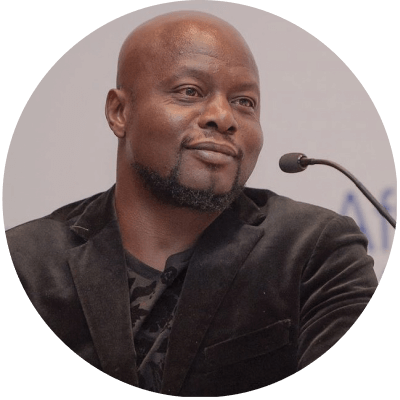Strands
Leadership Wisdom Series

Speaker Bio
Session
Q&A
SPEAKER BIO
Mamadou Toure is one of Africa’s most influential philanthropic leaders and the founder of Africa 2.0.
He was named one of the Top 10 Most Influential Men in Africa by Forbes Magazine in 2014. Mamadou founded the Ubuntu Group in 2015 and built on his global network and investment savviness to launch socio-economic projects throughout the continent of Africa. Over the past 20 years, Mamadou has worked in institutions such as KPMG, BNP Paribas Investment Banking, IFC (World Bank Group), and General Electric as Managing Director in charge of Investments and Project Finance for Sub-Saharan Africa.
He has worked on infrastructure, mining, agriculture and technology projects, exceeding a combined value of US$ 30 billion and thus creating opportunities and hope for many people in Africa.
Their Leadership Wisdom Series session focused on how they met at the World Economic Forum’s Young Global Leadership Program and how this paved the way for the creation of a dynamic initiative: The Ubuntu Challenge. They discuss the need for a recognition of humanity’s interconnectedness and interdependence – “we are one family, with one beating heart”.
The Ubuntu Challenge
Sheikha Bodour Al Qasimi & Mamadou Toure discuss the importance of recognising humanity in everything we do – especially entrepreneurship.
Both speakers believe in the concept of ‘Ubuntu’, which translates to: I am because we are. As humans, we were born loving and that is what Ubuntu reminds us of. It requires us to change our mindsets and to remind ourselves what makes us human. We are entering a world where everyone has a responsibility to make this world a better place. Both speakers focus on uncovering this intrinsic power to go beyond fear and remember love, in order to make a difference within our communities.
The Ubuntu love challenge started as a way to create a movement and inspire people to rise up to the challenges within their own community. They ask people to upload videos of themselves doing something kind and to challenge 12 others to do the same. This helped create momentum which they hoped would inspire a ripple effect of kindness.
Mamadou states that part of the purpose of the challenge was to lead by example and start some initiatives independently. This led to the creation of the UCAN programme: Ubuntu Care and Nurturing Programme.
Mamadou comments, “The whole point is to say: how do we make sure that someone who has a great idea, whether it is for profit or not for profit, will make a difference within the community and get the right amount of support. We then created this framework to help them communicate the idea of their project, get support from mentors and gain visibility to investors. You have geniuses hidden somewhere, in a tent or in a hut, that could have the potential to change the world. Let’s give them that chance and ensure the challenge works wherever they are, whatever their circumstances are.”
Q&A
What is the closest word to Ubuntu in the Arabic language?
I am completely fascinated by the word ‘Marhaba’. If you break it down, ‘Mar’ means Master or God and ‘Habba’ means love. So ultimately it was used by the Assyrians to say: ‘God is love and God is in you and you are love’. This is very similar to ‘Namaste’, meaning:
‘I salute the divinity in you’, which is very linked to ‘Ubuntu’, meaning ‘I am because you are’, thus illustrating that love is within each of us.
How do we hold those with power to account and empower the stakeholders?
The reality is I don’t think society has a choice today. We have learnt from the limit of excessive capitalism, in terms of resource depletion, inequalities, and new forms of communication. These have created natural reactions: first from the planet, second from the customer and third from stakeholders themselves. If your environment does not allow you to produce anymore, you are going to have to take a new environment into consideration. With the rise of environmentalist awareness and conscious consumerism, society is evolving naturally towards a stakeholder’s economy. The moment you involve stakeholders in the decisions, you’ll be more successful.
Is the digital world important for the work you do?
When we experienced the lockdown, a lot of our businesses stopped, especially in the publishing world. We depended on book fairs and travelling to different places all over the world and we couldn’t do that. Those of us who have online book stores were okay, but any books that weren’t digitised or didn’t have online selling opportunities were really impacted. I’ve had to recently urge publishers to take that leap of faith and invest in digital. There’s no time left to think or worry about it, this is the only answer right now. It has disrupted our industry tremendously.
What would your advice be to female leaders to overcome barriers?
We have to first acknowledge that men and women are different in terms of our leadership style and we all embody both masculine and feminine qualities, but one will be more dominant. There are examples of female leaders such as Jacinda Arden, who has really embraced her femininity in her leadership. She hasn’t seen it as a weakness, instead she’s used it as a strength, through showing real compassion for minorities during the Christchurch attack, for example. The ancient patriarchal system that we’re dealing with is crumbling and you see true leadership shining through by acts of understanding, compassion and kindness. My advice is to be yourself and embrace your intrinsic leadership style. Society will adapt.